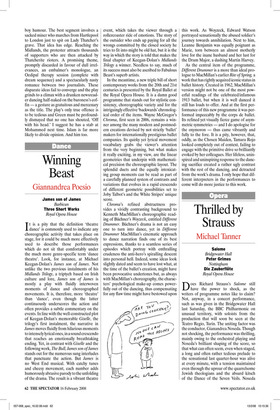Thrilled by Strauss
Michael Tanner
Salome Bridgewater Hall Peter Grimes Nottingham Die Zauberflöte Royal Opera House
Does Richard Strauss’s Salome still have the power to shock, as the writers of programme notes like to claim? Not, anyway, in a concert performance, such as was given in the Bridgewater Hall last Saturday, the BBC Philharmonic on unusual territory, with soloists from the production that will soon be seen at the Teatro Regio, Turin. The uniting factor was the conductor, Gianandrea Noseda. Though not shocking, the performance was thrilling, mainly owing to the orchestral playing and Noseda’s brilliant shaping of the score, so that what can often seem, even when staged, a long and often rather tedious prelude to the sensational last quarter-hour was alive at every minute, with a tension maintained even through the uproar of the quarrelsome Jewish theologians and the absurd kitsch of the Dance of the Seven Veils. Noseda commands his forces with the grandest gestures, frequently leaping in the air while imperiously summoning the brass, or crouching below the music stand in order to turn a creepy pianissimo into a stampeding climax. The orchestra clearly revelled in their chance to indulge themselves at such length in Strauss’s exhaustive catalogue of decadent effects, and any set of soloists would have been delighted to work with them.
This set of soloists, however, admirable performers as they are, may have felt that they were obbligati to a stunning concerto for orchestra. Noseda didn’t show much sympathy for them during the many deafening stretches, and the admirable artist Dagmar Peckova could more easily be seen gesturing ferociously than singing the role of Herodias, of which only a small proportion of notes reached me. Strauss is more merciful, for once, to his tenor, and Peter Bronder gave a great account of the neurasthenic (one has to use the word somewhere in a review of Salome) Herod, and gained the biggest applause at the end. This may have been a bit unfair to Nicola Beller Carbone in the title role. Her voice is a size too small for the part, and she was sometimes inaudible, but she purveyed the right kittenish temperament, the adolescent whimsy and casual ferocity of Salome, and she rose grandly to the climax, after the orchestra had had its phenomenal spasm as Jokanaan’s head was lifted from the cistern for her to fulfil herself with, or on. One imagines that in the theatre, with an orchestra on less manifestly exuberant form, the impact of the grotesque drama will be much greater; but it was not only exciting to hear so much detail, it also refuted a long-held view of mine that Strauss over-orchestrates here: it turns out that the more notes of this score you can hear, the more alluring, or fascinating, it becomes. The concert will have been broadcast by the time this notice appears, and I’ll be interested to see whether the BBC’s engineers can manage what no performance in the flesh can, and give us the best of both orchestral and vocal worlds.
Regular readers may feel they have had enough of me on Opera North’s Peter Grimes, but I was dissatisfied with how I reacted to it three weeks ago, so went to it again in Nottingham. The performance was electrifying in all respects, the audience evidently spellbound and almost unwilling to applaud at the end. Its most remarkable feature was the Grimes of Jeffrey Lloyd-Roberts, which has grown from impressiveness to greatness. He is now confident enough to take huge risks with his voice and his acting. He achieves the quietest threads of sound on high notes, he abandons all inhibitions and acts with that directness which, in a role as strong as this, leads to a response from spectators united in amazement at how moved they are. This, one feels, is what opera can do and nothing else, almost, can: the immediacy of the impact, in a medium where we aren’t used to being exposed to such dreadful intensities, leads you to become, in Wagner’s phrase, ‘knowers through feeling’. The production will be at Sadler’s Wells again. This is the most unmissable of contemporary operatic productions.
The next evening I revisited the Royal Opera’s Die Zauberflöte, with the second, still distinguished cast, but the same deadly baton of Roland Böer. So far as one could judge in such a demoralising context, the Tamino of Pavol Breslik is a distinct improvement. What I went for was Kate Royal’s Pamina, and alas was not quite so moved as I hoped. Her lovely singing is still marred by vague diction, and she communicates dignity without much warmth. That surprised me, because as the Countess in Figaro with Glyndebourne on Tour she had everything — but that included a superb conductor. Christopher Maltman had the impossible task of taking over Papageno from Simon Keenlyside, and unwisely tried an imitation of the inimitable. Only Robert Lloyd, singing with Hotter-like nobility and richness of tone as the Speaker, managed to lift proceedings for a tantalising few minutes to a level of inspired grandeur, with which this opera should be imbued.



















































































 Previous page
Previous page